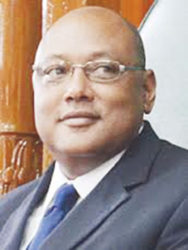The Lotteries Commission is not functioning and its Chair, Natural Resources Minister Raphael Trotman, is of the view that it should be dissolved.
Speaking with Stabroek News at the National Assembly last Thursday, Trotman once again noted that the commission has not met since its appointment in 2015.
He explained that since there is only one lottery company, Canadian Bank Note Ltd (CBN) the commission is not required to regulate payment of licence fees from several entities, while other functions such as regulating the spending of the amounts paid is not a statutory responsibility of the commission.
“Those duties have been taken on by the Ministry of Finance, so there is really nothing for the commission to do,” Trotman said.

His position on the functions of the commission appear to be in direct contrast to the position held by Minister of Finance Winston Jordan and Minister of State Joseph Harmon.
Jordan has repeatedly told Stabroek News that the commission is required to make decisions in relation to the fund and provide the ministry with a report of its decisions, while Harmon has told a post-Cabinet press conference that any deductions from the fund must first be approved by the commission, which would convey that recommendation to the Ministry of Finance.
As explained in the 2015 Auditor General’s report, the agreement between the Government of Guyana and CBN that established the Guyana lottery requires CBN to pay licence fees equivalent to 24% of gross revenue.
In 1996, the Guyana Lotteries Commission was established by a Cabinet decision to manage the licence fees received and ensure that amounts spent are within the national sector and in accordance with the guidelines for access to the lottery funding. Over the years, the Lotteries Commission received proceeds from the lotto games that were used to make payments approved by Cabinet. These proceeds were retained in a special bank account and no amounts were paid over to the Consolidated Fund.
This decision has regularly been criticised by the Auditor General (AG), who has said in his reports that it violates Section 43 of the Fiscal Management and Accountability Act.
Section 43 of the Act says that “except as otherwise provided in this Act or in any other law, at the end of each fiscal year, any unexpended balance or public moneys issued out of the Consolidated Fund shall be returned and surrendered to the Consolidated Fund.”
The AG’s 2015 report specifically noted that government spent in excess of $305 million from the Lottery Fund on projects, such as the D’Urban Park rehabilitation, without seeking needed parliamentary approval.
The 2015 report, which was laid in the National Assembly on October 13 last year, explained that while the Ministry of Finance budgeted for lottery receipts of $1 billion under the category ‘Miscellaneous Revenue’ and transferred $1.069 billion from the lottery fund to the Consolidated Fund, spending from the fund continues to occur without parliamentary approval.
As a result, it has recommended that expenditure from the proceeds of the National Lottery should be accounted for by having a supplementary estimate passed in the National Assembly and recorded in the public accounts.
According to the report, aside from the amount transferred to the Consolidated Fund, significant sums, which include prior year balances of $369,294 million and the proceeds of $421,754 million received for 2015, still remain in the bank account and were used to meet expenditure.
It said $305,826 million was spent, comprising $36,509 million for the rehabilitation of D’Urban Park, $65,060 million for Carifesta, $63,700 million for Mashramani, $51,583 million for music, $38,256 million for Amerindian Heritage celebrations, $28,573 million for the Department of Youth, Culture and Sport, $18,260 million for Emancipation, $14,591 million for tourism, and $2,003 million for miscellaneous purposes.





